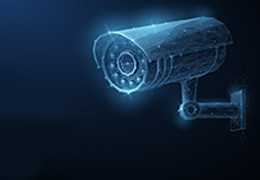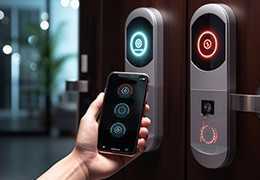In an era where technological advancements are pivotal, smart security stands as a beacon of innovation, transforming the way we protect our homes, workplaces, and personal spaces. This comprehensive exploration delves into the multifaceted world of smart security, shedding light on its components, technological underpinnings, and the profound impact it has on our lives.
Introduction to Smart Security
At the core of smart security is the integration of advanced technologies such as Artificial Intelligence (AI), the Internet of Things (IoT), and blockchain to create systems that are not only reactive but also predictive, capable of anticipating threats and mitigating them before they can cause harm. The evolution from traditional lock-and-key mechanisms to sophisticated, interconnected systems represents a leap forward in our quest for safety and security.
The Importance of Smart Security
In the sanctity of our homes and the bustling environment of our workplaces, smart security offers unparalleled peace of mind. It extends beyond the confines of physical spaces, safeguarding personal information against cyber threats, an increasingly pertinent concern in the digital age. The versatility of smart security systems means they can be tailored to the unique needs of each user, providing customized protection solutions.
Components of a Smart Security System
A quintessential smart security system comprises an array of devices working in concert. Smart cameras and sensors form the eyes and ears, detecting motion and unusual activities. Smart locks and alarm systems act as the first line of defense, fortifying entry points against unauthorized access. The seamless interplay of these components ensures a robust security posture.
Technology Behind Smart Security
The prowess of AI and machine learning algorithms lies in their ability to learn from data, recognizing patterns and anomalies that may indicate a security breach. The IoT framework connects disparate devices, enabling them to communicate and act upon shared intelligence. Meanwhile, blockchain technology offers a tamper-proof record, enhancing the integrity of the system against cyber manipulations.
Smart Security for Homes
Adopting smart security for residential areas means investing in a system that offers more than just surveillance. It's about creating a responsive environment that adjusts to the presence or absence of inhabitants, managing access, and providing alerts in real-time. The installation process has been simplified, making it accessible to a broader audience, and choosing the right system involves balancing features with affordability.
Smart Security in the Workplace
In the corporate realm, smart security systems safeguard not only physical assets but also intellectual property. They contribute to a secure work environment, enhancing employee productivity by mitigating concerns about personal safety. Integration with existing infrastructure, such as HVAC and lighting systems, further exemplifies the adaptability of smart security solutions.
Cybersecurity and Smart Security
The interconnectedness that defines smart security also presents vulnerabilities. Cybersecurity measures are essential to protect against digital threats, encompassing everything from secure encryption protocols to regular software updates. Adhering to cybersecurity best practices ensures the longevity and reliability of smart security systems.
Smart Locks and Access Control
Access control has evolved with the advent of smart locks, offering features like biometric authentication and remote access. These technologies not only enhance security but also offer convenience, allowing homeowners and businesses to manage entry permissions with unprecedented flexibility.
Surveillance and Monitoring
Modern surveillance systems offer high-definition video feeds and the ability to monitor spaces in real-time from anywhere in the world. Concerns about privacy are addressed through stringent data protection measures, ensuring that surveillance is conducted ethically and responsibly.
Smart Alarms and Notifications
The immediacy of smart alarms and notifications can be the difference between a thwarted burglary and a successful one. Customizable alerts mean that users can prioritize notifications, ensuring that they are informed of critical events as they happen.
The Role of AI in Smart Security
AI stands at the forefront of smart security, enabling systems to not only detect but also predict potential security incidents. Facial recognition and anomaly detection are among the cutting-edge technologies being employed to offer proactive protection.
Smart Security for Vehicles
Vehicles, too, benefit from smart security technologies, with GPS tracking and remote monitoring offering protection against theft and unauthorized use. The integration of these systems into personal and commercial vehicles underscores the pervasive nature of smart security.
Energy Management and Smart Security
The convergence of smart security and energy management systems exemplifies the holistic approach to modern living. Automated lighting and smart thermostats contribute to energy efficiency while enhancing security, illuminating the interconnectedness of these domains.
Smart Security in Public Spaces
The application of smart security in public spaces involves a delicate balance between safety and privacy. Technologies such as crowd management systems and emergency response protocols demonstrate the potential of smart security to safeguard public welfare while respecting individual rights.
The Future of Smart Security
As we look to the future, the trajectory of smart security is set to ascend, propelled by innovations in AI, IoT, and 5G technologies. The challenges that lie ahead are matched by the opportunities to create safer, more secure communities.
Choosing a Smart Security Provider
Selecting a smart security provider is a critical decision, influenced by factors such as technological capabilities, cost, and customer support. Recommendations and reviews play a vital role in this process, guiding consumers toward the best solutions for their needs.
Installation and Setup
The debate between DIY and professional installation of smart security systems hinges on personal preference and technical proficiency. Regardless of the chosen path, the emphasis should be on a seamless setup process and ongoing support for maintenance and updates.
Legal and Ethical Considerations
The legal landscape surrounding smart security is complex, navigating data protection laws and the ethical implications of surveillance. These considerations are paramount in ensuring that smart security technologies are deployed responsibly.
Case Studies
Examining real-world applications of smart security, from residential setups to commercial installations, offers valuable insights into the practical benefits and challenges of these systems. These narratives underscore the transformative potential of smart security.
Smart security represents a significant advancement in our collective effort to protect what matters most. Its evolution from simple deterrents to sophisticated, interconnected systems reflects the progress we've made and the path forward. As we embrace these technologies, we do so with the understanding that security is not just about prevention but also about empowerment, providing individuals and communities with the tools they need to live safely in an ever-changing world.
 Beyond Convenience: How Smart Devices Can Enhance Home Security03/28/2024Posted in: GuideRead more
Beyond Convenience: How Smart Devices Can Enhance Home Security03/28/2024Posted in: GuideRead more The Ultimate Smart Home Starter Kit: Must-Haves for Beginners (Affordability Edition)03/28/2024Posted in: GuideRead more
The Ultimate Smart Home Starter Kit: Must-Haves for Beginners (Affordability Edition)03/28/2024Posted in: GuideRead more Illuminate Your Life: Home Lighting Automation Explained03/28/2024Posted in: Smart HomeRead more
Illuminate Your Life: Home Lighting Automation Explained03/28/2024Posted in: Smart HomeRead more
 Enhance Your Home Security with a Smart Lock: The Ultimate Guide03/28/2024Posted in: Smart HomeRead more
Enhance Your Home Security with a Smart Lock: The Ultimate Guide03/28/2024Posted in: Smart HomeRead more
 The Ultimate Guide to Home Automation Hubs02/12/2024Posted in: Smart HomeHome automation...Read more
The Ultimate Guide to Home Automation Hubs02/12/2024Posted in: Smart HomeHome automation...Read more Enhance Your Security: Smart Home Solutions02/12/2024Posted in: Smart HomeIn today's...Read more
Enhance Your Security: Smart Home Solutions02/12/2024Posted in: Smart HomeIn today's...Read more Smart Light Compatibility: Ensuring Seamless Integration02/12/2024Posted in: Smart LightingIn the realm of...Read more
Smart Light Compatibility: Ensuring Seamless Integration02/12/2024Posted in: Smart LightingIn the realm of...Read more
 Beyond Convenience: How Smart Devices Can Enhance Home Security03/28/2024Posted in: GuideSmart home...Read more
Beyond Convenience: How Smart Devices Can Enhance Home Security03/28/2024Posted in: GuideSmart home...Read more The Ultimate Smart Home Starter Kit: Must-Haves for Beginners (Affordability Edition)03/28/2024Posted in: GuideTurn your home...Read more
The Ultimate Smart Home Starter Kit: Must-Haves for Beginners (Affordability Edition)03/28/2024Posted in: GuideTurn your home...Read more Illuminate Your Life: Home Lighting Automation Explained03/28/2024Posted in: Smart HomeThis guide...Read more
Illuminate Your Life: Home Lighting Automation Explained03/28/2024Posted in: Smart HomeThis guide...Read more
 Enhance Your Home Security with a Smart Lock: The Ultimate Guide03/28/2024Posted in: Smart HomeThis guide...Read more
Enhance Your Home Security with a Smart Lock: The Ultimate Guide03/28/2024Posted in: Smart HomeThis guide...Read more





Leave a comment